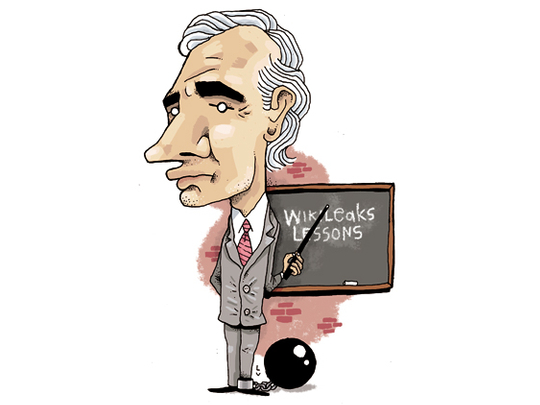
A caller to a radio talk show last week drew an interesting analogy between Julian Assange and Al Capone.
Assange is the man who single-handedly exposed hundreds of thousands of United States secrets through his whistle-blower website WikiLeaks. Don't try to look for it because it has been blocked in most countries. Alphonse Gabriel ‘Al' Capone (who died in 1947), meanwhile, was the legendary Italian-American gangster.
The caller didn't mean of course that Assange was a gangster. He was cleverly drawing attention to the fact that Al Capone had committed every offence in the book, from bootlegging liquor and bribing government officials to prostitution and murder. But the law was not able to hold him to account but on a tax evasion felony for which he was sentenced to 11 years in Alcatraz, the infamous prison also known as The Rock.
For his part, Assange has been accused of all sort of serious crimes by the US and many of its allies for publishing the Secret Embassy Cables. He has been accused of espionage, although it is not clear for whom he spied, endangering the lives of "countless people" by exposing their roles, according to the US Department of State, and even treason.
But it only took "sex by coercion" and "sexual harassment" charges to put the Australian open-government crusader behind bars. Many are convinced he was "framed".
Some reports (Daily Mail, December 7) quoted court papers as saying both women, who accused Assange of molestation and abuse, were "consensual partners".
A timeline of the charges shows that both women had in fact sought very hard to meet Assange and both encounters took place in the homes of those women. Even after the encounters, the women were very happy to accompany him to parties, lunches and coffee breaks and one of them even tweeted how ‘thrilled' she was to be in his company.
Guilty or not; it is certainly up to the court to decide. He could very well have done what he is being accused of. And he might be exonerated. The next few weeks will tell.
But so far, the analogy offered by the caller to the evening radio talk show is not the only lesson we ought to learn from the whole WikiLeaks saga.
There are many lessons to learn. Some of these concern American diplomats and others are actually personal - concern you and me. Here we go:
1. The US administration depends for drawing up its plans and its view of the world on the analysis and perception of its sometimes inexperienced diplomats. This is a serious problem. So, when an American diplomat says that Robert Mugabe, the longtime leader of Zimbabwe, is "a crazy old man," then he must be. A number of US diplomats appeared in the leaked cables as not being able to make up their minds.
Some of them offered an ‘analysis' that is completely contradicting a cable by another diplomat, especially on the Middle East and some of its leaders. One cable describes Yemeni President Ali Abdullah Saleh as losing control whilst another note says he was ‘tough' and ‘authoritarian'. Foreign government should doubt the US administration's judgment and perhaps ask for evidence. How? I don't know.
2. It appears that all the Hollywood movies which we always protested against for showing Arab and African leaders in stereotypical — actually more of out of 1001 Nights — characters have been written by US diplomats. I don't think they will ever win Oscars, though.
3. Washington, which has been pushing certain countries, deemed by the America's ‘keep writing what they confide in us' envoys as being secretive and authoritarian, to open up and climb the ladder of the Transparency Index, actually doesn't like transparency when it comes to its talks with other countries. Can you say, drink from the same cup? How dare you vilify China for trying to ‘sober up' Google when your National Security Agency nerds attacked and managed to sabotage hundreds of WikiLeaks mirror sites?
4. The last point can be repeated; just replace the US with any Western European state.
5. Back to the US. And it is a great lesson for other governments. When your officials meet with US diplomats, make sure that they carry no pens and pads. Ask them to leave their mobile phones at the door, too.
6. Western justice (can we say that? I guess if it was OK to say Arab justice or Arab psyche, then why not?) can be swift if and when the Americans want. Pictures and bios of the assassins of Al Mabhouh — remember, the Hamas commander killed in Dubai in January — have been posted on the Interpol website for almost a year and no arrest has been made, except one which Canada wanted to cover up.
Meanwhile, in few days of issuing an Interpol warrant, Assange was arrested and denied bail despite the original prosecutor's recommendation to dismiss the case. Do we need to say more? Sure. Ariel Sharon, the butcher of Arab children in Sabra and Shatila and in Jenin was considered by Washington and its allies to be a man of peace while his arrest warrant on charges of crimes against humanity was kept in the drawers of Belgian, French and British prosecutors.
7. On a final and more serious note, if the Anonymous group, which supports Assange, succeeded in bringing down the websites of huge multinationals such as MasterCard, Visa and PayPal, how protected you think you are?
Do you think you are safe, within your firewalls, browsing, chatting or tweeting the recipe of your Friday brunch? Think again.








